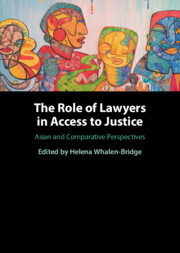Book contents
- The Role of Lawyers in Access to Justice
- The Role of Lawyers in Access to Justice
- Copyright page
- Dedication
- Epigraph
- Contents
- Figures
- Tables
- Appendices
- Contributors
- Foreword
- Acknowledgements
- Abbreviations
- 1 Understanding and Comparing Access to Justice
- Part I Access to Justice in Asia
- 2 Pro Bono, Legal Aid, and the Struggle for Justice in China
- 3 Access to Justice in India: Managing Multiple Mechanisms in a Restrictive Practice Environment
- 4 Access to Justice in Indonesia: Searching for Meaning
- 5 Access to Justice and Lawyer Independence in Japan
- 6 Improving Access to Justice in Malaysia: Introspection, Purpose, and Dynamism
- 7 Political Lawyers and the Legal Occupation in Myanmar
- 8 Alternative Lawyering versus Pro Bono in the Philippines: From Challenging an Authoritarian Government to Working with the State
- 9 Access to Justice in Singapore: A Government and Lawyer Dynamic
- 10 Public Interest Lawyering in South Korea: Standing on the Shoulders of Giants
- 11 A Hub, a Knot, and a Powerhouse: The Legal Aid Foundation and Access to Justice in Taiwan
- 12 Lawyers and Democratic Centralism in Vietnam
- Part II Comparative Perspectives on Access to Justice
- Index
4 - Access to Justice in Indonesia: Searching for Meaning
from Part I - Access to Justice in Asia
Published online by Cambridge University Press: 29 September 2022
- The Role of Lawyers in Access to Justice
- The Role of Lawyers in Access to Justice
- Copyright page
- Dedication
- Epigraph
- Contents
- Figures
- Tables
- Appendices
- Contributors
- Foreword
- Acknowledgements
- Abbreviations
- 1 Understanding and Comparing Access to Justice
- Part I Access to Justice in Asia
- 2 Pro Bono, Legal Aid, and the Struggle for Justice in China
- 3 Access to Justice in India: Managing Multiple Mechanisms in a Restrictive Practice Environment
- 4 Access to Justice in Indonesia: Searching for Meaning
- 5 Access to Justice and Lawyer Independence in Japan
- 6 Improving Access to Justice in Malaysia: Introspection, Purpose, and Dynamism
- 7 Political Lawyers and the Legal Occupation in Myanmar
- 8 Alternative Lawyering versus Pro Bono in the Philippines: From Challenging an Authoritarian Government to Working with the State
- 9 Access to Justice in Singapore: A Government and Lawyer Dynamic
- 10 Public Interest Lawyering in South Korea: Standing on the Shoulders of Giants
- 11 A Hub, a Knot, and a Powerhouse: The Legal Aid Foundation and Access to Justice in Taiwan
- 12 Lawyers and Democratic Centralism in Vietnam
- Part II Comparative Perspectives on Access to Justice
- Index
Summary
Advocates in Indonesia do not generally provide free legal assistance to poor persons. Advocates largely believe that these matters should be handled by non-governmental organizations, and it is these organizations that have been the drivers of legal services to the poor, not lawyers. Indonesia also faces some confusion between ‘legal aid’ and ‘free legal assistance’, as both terms can be translated as ‘bantuan hukum’, and the historical conflation of these two terms has not supported identification of a lawyers’ responsibility in access to justice. Historically the state did not have an obligation to provide legal services to poor persons, although this changed in 2011 with the Law on Legal Aid, which created a state obligation to provide legal aid. This law is a major step forward, but there are indications that state-paid legal aid services from the ‘legal aid organizations’ recognized under the law will now take centre stage, and that pro bono will not develop. Access to justice in Indonesia therefore continues to search for meaning: literally in the sense that neither legal aid nor pro bono are clearly understood, figuratively, as there is no vision of how to proceed, and practically, as many barriers impede current programmes.
- Type
- Chapter
- Information
- The Role of Lawyers in Access to JusticeAsian and Comparative Perspectives, pp. 56 - 72Publisher: Cambridge University PressPrint publication year: 2022

